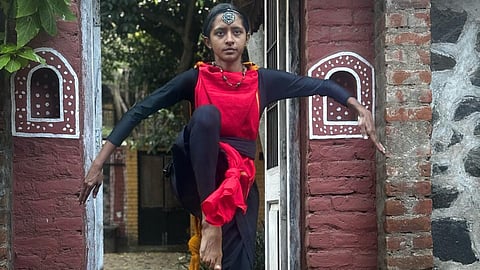
- LIFESTYLE
- FASHION
- FOOD
- ENTERTAINMENT
- EVENTS
- CULTURE
- VIDEOS
- WEB STORIES
- GALLERIES
- GADGETS
- CAR & BIKE
- SOCIETY
- TRAVEL
- NORTH EAST
- INDULGE CONNECT

Vengeance, the serpent at the heart of the Mahabharata’s Adi Parva, rears its head once again in Serpent Tongue. Written by V Balakrishnan, this reimagining of an ancient myth speaks to the heart of human nature and the destructive cycle of revenge that stretches across time. The play delves deeply into the episode of the Sarpa Satra—the sacrificial massacre of snakes—and through its events, it asks: What happens when we are consumed by vengeance?
Drawing from the original text, Serpent Tongue reinterprets the actions of Janmejaya, Takshaka, and the aftermath of the snake massacre, making them not merely relics of a forgotten age but a living reflection of ourselves. As Balakrishnan notes, “The figures of Janmejaya, Takshaka, and their ilk are not confined to ancient texts—they walk among us still.” Each time we turn a blind eye to evil, we summon them back into existence. In this retelling, vengeance is not just a historical fact but an ever-present force, as real and dangerous as the very breath we take.
The play explores how vengeance warps the human soul, turning individuals into predators, not for survival, but for power. “History does not repeat itself, humans repeat it,” says Balakrishnan, revealing how the past lives on in our deeds. We are the same creatures who, driven by revenge, perpetuate cycles of destruction. The acrid scent of burning vengeance lingers long after the smoke has cleared. The play serves as a haunting reminder: “Never forget the dead, for in their shadows, we are often compelled to reckon with our own.” As the characters wrestle with their desires and ambition, their moral struggles mirror those we face daily in our own lives, caught between destiny and free will, right and wrong.
Director Shakthi Ramani’s vision brings a modern sensibility to this ancient tale, making its themes resonate with contemporary audiences. “I believe stories, conflicts, and the concept of the ‘saviour’ or ‘endeavour’ will always be relevant to human nature,” she explains. The play’s structure, shaped by the unique design of the performance space, allows for an exploration of physicality, where the actors embody the serpentine movements of treachery and deception. The symbolism of the serpent is not merely an aesthetic choice; it drives home the play’s exploration of betrayal, deception, and the perils of blind vengeance. The actors’ bodies slither and curl, mimicking the serpent’s sinuous form, as they embody the dangerous dance of revenge and power.
As Shakthi emphasises, lighting and music are essential to creating the chilling atmosphere that engulfs the audience. The immersive world of Serpent Tongue pulls viewers to the edge of a cliff, a place where danger looms, but where the safety of their reality is never too far away. The sense of unease is heightened by every hiss, every movement, every note, until the audience finds themselves drawn into a world not quite their own, where the boundaries between past and present blur.
Tickets at INR 400.
March 29 & 30, 7 pm.
At Spaces, Besant Nagar.
Email: rupam@newindianexpress.com
X: @rupsjain